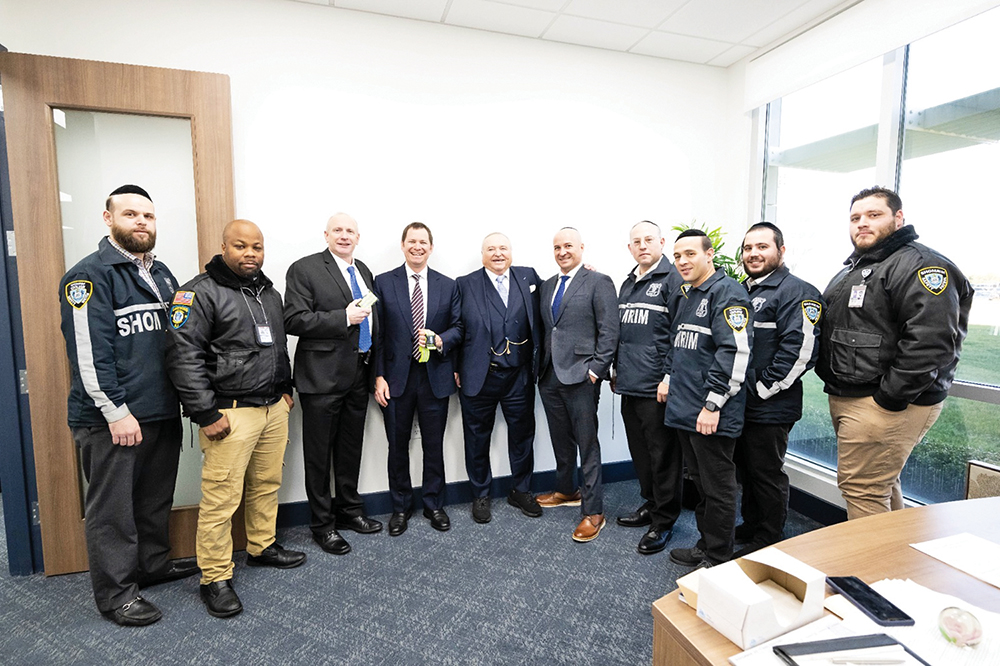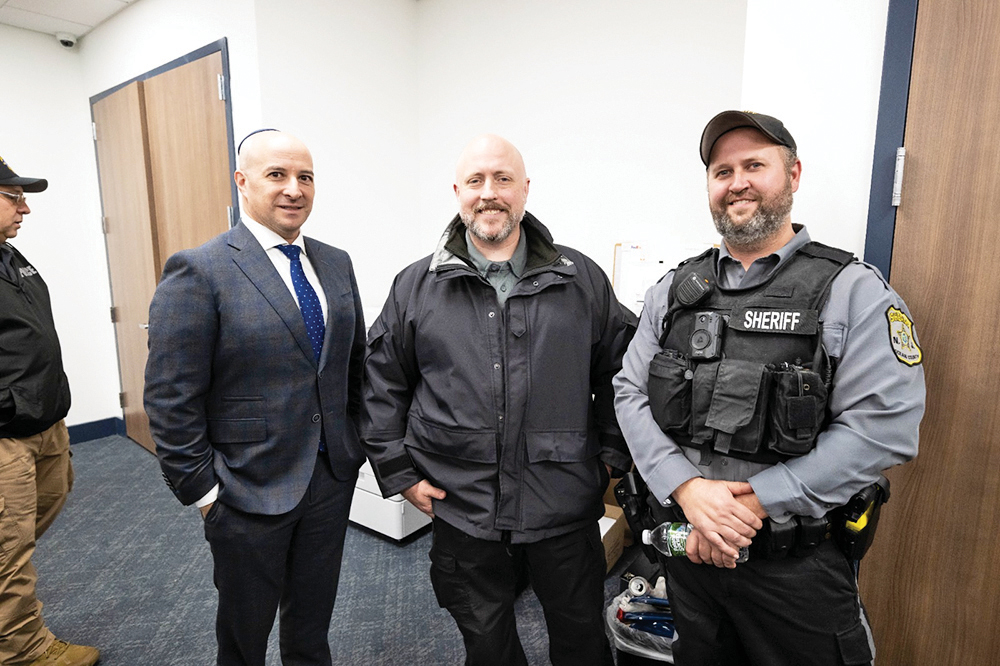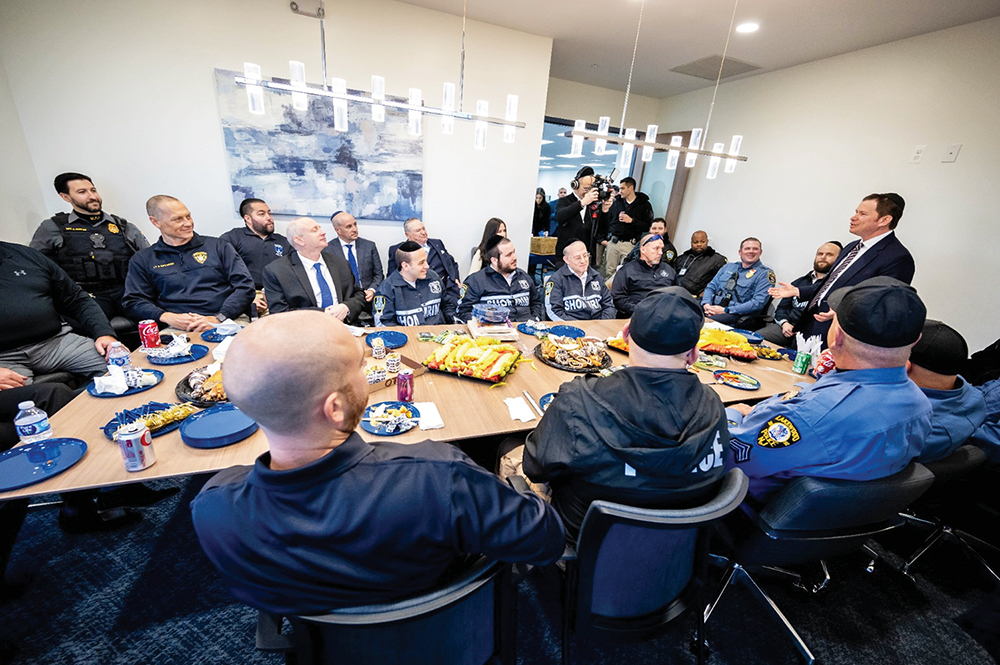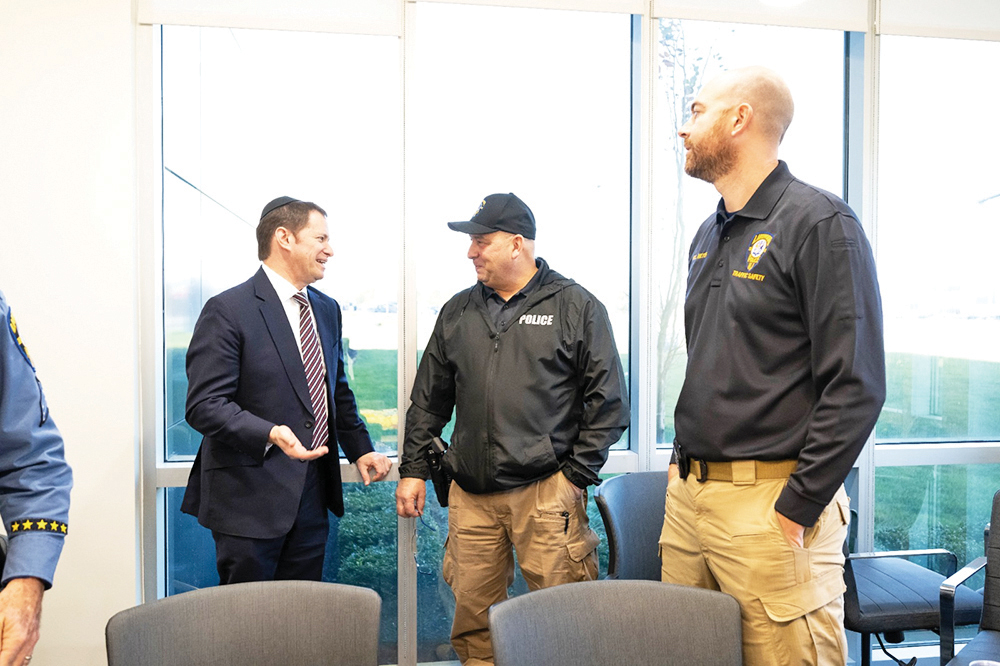
(Courtesy of Rothenberg Law Firm) In a joint initiative aimed at enhancing pedestrian safety, Shomrim and the Rothenberg Law Firm have partnered for a second consecutive year to provide free reflectors to residents in the Ocean County and Monmouth County regions. This initiative is part of a concerted effort to reduce the growing number of pedestrian-involved accidents across the region, which sees hundreds of such incidents annually.
The reflector giveaway campaign was officially launched at an event hosted at the Rothenberg Law Firm’s Lakewood office with the participation of numerous police departments and law enforcement agencies, during which general contemporary community safety issues were discussed, as well.
The Rothenberg Law Firm, which has been a decades-long industry leader in personal injury litigation, has embarked over the years on numerous community safety initiatives as it seeks to safeguard and protect the communities they serve. Founded in 1969 by Allen K. Rothenberg, the firm has secured multiple billion dollar and numerous multi-million dollar settlements for catastrophically injured individuals.

“I’ve been handling personal injury cases for decades and we have recovered hundreds of millions of dollars for our clients. However, I have never seen one client who wouldn’t give back every penny they received in a settlement if they could be restored to the condition they were in before,” Allen Rothenberg remarked, stressing the importance of ensuring personal safety.
His wife Barbara and six of their children — Harry, Marc, Beth, Ross, Scott, and Melissa — are all lawyers with the firm, and each have echoed his sentiments.
“We always hope that people will not need our services, and we therefore actively work to ensure that people have the necessary resources to keep themselves safe. This reflector giveaway initiative is part and parcel of that mission,” said Harry, an attorney with the firm.
Ten thousand reflectors were purchased for this initiative by the Rothenberg Law Firm. Made of highly reflective and high-quality fabric, they are sure to provide high visibility and ease of use for pedestrians walking darkened streets over the coming winter months. Additionally, a billboard message from the law firm shines brightly over Route 9 in Howell, New Jersey urging pedestrians to “be seen, be safe.”

“Pedestrian safety is critical, especially on dark and rural roadways,” Jackson police chief Matthew Kunz said at the kickoff event. “This initiative to give out safety belts to protect our residents is extremely important and we are grateful for the opportunity to partner with all our law enforcement colleagues in this matter.”
“I would like to thank Shomrim and the Rothenberg Law Firm for taking pedestrian safety seriously, and giving them the resources to keep them safe,” said patrolman Stephen Meyer of the Lakewood Police Department.
“These reflective belts will make pedestrians more visible at night and thereby less prone to injuries and accidents,” remarked B. Murphy of the Brick Township Police Department. Those comments were echoed by Sgt. Joe Fastige of the Manchester Police Department. “We have many side streets that don’t have street lights or sidewalks, which pose a safety hazard. Now, when our patrol officers see someone walking without reflective gear, we now have the ability to hand these out to them. It will be a lifesaving gamechanger for our community.”

A Howell Police Department official emphasized the campaign’s timeliness, noting, “As we face shorter days and longer nights, the risk to pedestrians increases. These reflectors are a crucial tool in making our residents visible to drivers.”
In addition to the reflector belt initiative, members of various law enforcement agencies, including from the Ocean County Sheriff’s Office and local police departments, expressed their unyielding resolve and commitment to confronting troubling spikes in crime and concerns over increasing antisemitism and other forms of hate.
“We have incredible police departments here that are not only committed to pedestrian safety, but are protecting us in many other ways,” said Allen. “We have a horrible situation right now with overt antisemitism and the police are there to protect us and provide the security needed to make these safe and thriving communities.”

Day and Night: The Difference A Reflector Makes
Many officials at the meeting launching the safety belt initiative spoke of the need for pedestrians to take meaningful, proactive measures to ensure their safety while walking and cycling through the streets. “Simply wearing a reflector is not enough to guarantee your safety. “It is crucial that all laws and safety tips provided to residents are followed,” said chaplain Yisroel Bursztyn of Lakewood Shomrim, a citizen safety patrol organization.
Calling the choice to wear reflectors “a literal difference of day and night, darkness and light,” officials emphasized that countless incidents of pedestrians and cyclists being struck and severely injured could have been avoided had they only been wearing the proper gear.

Beyond wearing reflective clothing, those include:
Using Crosswalks and Intersections: Always cross streets at marked crosswalks or intersections, where drivers expect pedestrians. Look for traffic signals and obey them diligently. Even at crosswalks, make eye contact with drivers to ensure they see you.
Staying Alert: Distractions can be dangerous. Avoid using electronic devices that take your attention off the road. Be particularly cautious when listening to music with headphones — it can prevent you from hearing an approaching car or emergency vehicle.
Walking on Sidewalks: Whenever possible, use sidewalks. If a sidewalk is not available, walk on the edge of the road facing traffic. This allows you to see oncoming vehicles and react if necessary.
Understanding and Anticipating Driver Behaviors: Recognize common situations that may lead to accidents, such as drivers turning at intersections or backing out of driveways. Don’t assume a driver has seen you; a nod, wave or eye contact can confirm they have.
Obeying Traffic Signals and Signs: Follow pedestrian signals and avoid crossing when the “Don’t Walk” sign is flashing or lit. Even if you have the right-of-way, ensure that traffic has stopped or passed before you step onto the road.
Avoiding Alcohol and Drugs: Impairment by alcohol or drugs affects your ability to walk safely. It alters your coordination, judgment and reaction times, increasing your risk of an accident.
Being Cautious at Bus Stops: When getting off a bus, wait for it to leave before crossing so you can see and be seen by drivers. Never cross in front of or behind a bus where drivers may not see you.
Teaching Children About Pedestrian Safety: Educate children about the rules of the road and safe pedestrian behaviors. Accompany young children and hold their hands when crossing streets.
Being Mindful of Weather Conditions: Inclement weather can affect visibility and road conditions. Be extra cautious during rain, snow or fog.
Looking and Listening: Even if you have the right of way, look both ways before crossing and listen for oncoming traffic. Never assume a vehicle will stop — make eye contact with drivers to ensure they see you.
The reflectors sponsored by Rothenberg Law can be picked up at the firm’s Lakewood office, 300 Boulevard of the Americas, Lakewood, New Jersey; at participating police department headquarters; and from Shomrim headquarters, 199 Ocean Ave., Lakewood. Additionally, police vehicles will be stocked with reflectors, allowing officers to provide them to pedestrians during their patrols.
For more information about the reflectors, contact Shomrim at (732) 367-1212.

Reflectors and Halacha: What Is Our Duty?
For the past several decades, the rabbonim of Lakewood have made it clear: wearing a reflector is a matter of pikuach nefesh and must be taken with the utmost seriousness — including on Shabbat. While wearing reflective gear is important in every community, it is particularly important in Lakewood, where many residents wear dark clothing, making it especially difficult for drivers to spot them.
Several years ago, the BMG roshei yeshiva signed a joint kol koreh urging the kehillah to wear reflectors, stressing the chiyuv of wearing reflectors and pointing to the many tragedies that have befallen families in Lakewood as a warning.
The mashgiach, Rav Mattisyahu Salomon, z”l would often exhort talmidei hayeshiva to wear reflectors at night, even dedicating an entire shmuess to the topic. In no uncertain terms, the mashgiach underscored the responsibility of each yid to wear a reflective belt in order to protect themselves and avoid the chillul Hashem made when non-Jews see us walking in a reckless manner.
In response to many inquiries regarding the use of reflectors on Shabbat, leading poskim have stated unequivocally that they are a permitted use. According to a psak halacha issued by Rav Yaakov Forscheimer, Rav Shmuel Felder, Rav Shmuel Meir Katz, Rav Osher Chaim Lieberman, Rav Shmuel Blech, Rav Simcha Bunim Cohen, Rav Shmuel Kamenetzky, Rav Shlomo Miller, Rav Moshe Heinemann, Rav Binyamin Halpern, and Rav Shlomo Gissinger, z”l:
Reflectors should preferably be worn as belts.
All reflector belts are muttar as long as they are securely fitted, even if your coat does not have loops and/or does not come with a belt.
If your coat has a stitched-on belt, leave the regular belt untied and use the reflector as the belt in its place.
If you are not wearing a coat, a reflective belt may be worn over your suit jacket (Note: If you are wearing a gartel or kittel, ask your rav.)
A reflective belt may be worn regardless of whether the street is brightly or dimly lit.
A reflector may be worn on Shabbat, even if you only need it for Motzei Shabbat.
Reflectors should be donned inside a home and only removed once your destination is reached (Note: If a police officer hands you a reflector while walking on Shabbat, you may stand in place and put it on.)












